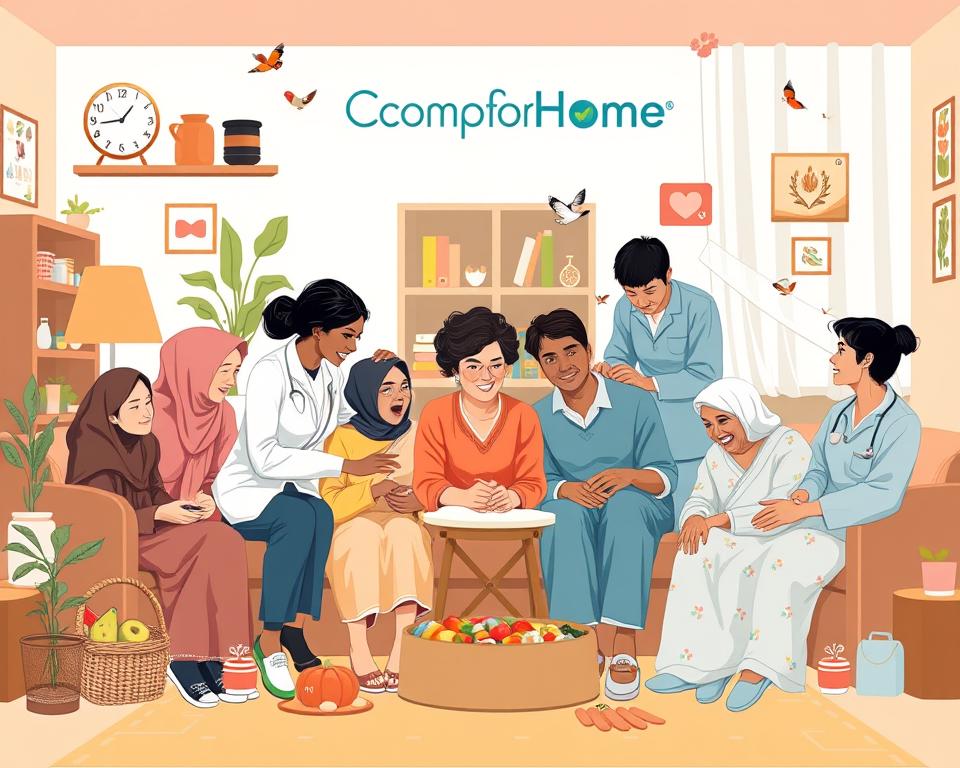In Ontario, over 200 ethnic origins are represented. Providing culturally sensitive home health services is crucial. At Ontario Home Health Services, we focus on inclusive care. We ensure each person gets the support they need, respecting their cultural identity.
Our team includes care coordinators, nurses, and personal support workers. Together, they create personalized care plans for our clients. This approach meets the diverse needs of our community.
We are a leading provider of government-funded home health services in Ontario. We offer nursing care, personal support, and homemaking assistance. Our aim is to help people live independently at home, with comfort, dignity, and a sense of belonging.
We make sure cultural sensitivity is part of our service. This way, our clients feel truly understood and respected. It’s our commitment to them.
Key Takeaways
- Ontario Home Health Services provides culturally sensitive home health services to diverse populations in Ontario.
- Our team of regulated health professionals develops personalized care plans that cater to the unique needs of each client.
- We offer a wide range of government-funded services, including nursing care, personal support, and homemaking assistance.
- Our goal is to empower individuals to live independently in their homes while honoring their cultural identity.
- Incorporating cultural sensitivity into every aspect of our service ensures that our clients feel understood and respected.
Understanding Cultural Sensitivity in Ontario Healthcare
At Ontario Home Health Services, we know how much culture affects our values and beliefs. We make sure our care is culturally-responsive in our diverse healthcare system. We meet each client with an open mind, ready to learn and respect their dignity and independence.
Our team is trained to help clients make choices and understand different communication styles and healthcare ethics. We care for Indigenous communities, people with disabilities, and those from various languages. We aim to make a welcoming space that values each person’s cultural identity.
We offer French language services and use culturally safe practices. Our goal is to make sure everyone has equal access to quality home health services. We want to help our clients and their families make informed care decisions.
Essential Components of Home Health Services in Ontario
Our home health agency offers a wide range of services. These include nursing care, personal support services, homemaking services, and community support services. We aim to help people stay independent and healthy at home.
Our nursing care services are customized for each client. We help with daily tasks, manage medications, and watch over chronic conditions. Personal support services help with bathing, grooming, and more. This ensures our clients feel dignified and comfortable.
We also provide homemaking services like cooking, cleaning, and laundry. These services make homes clean and comfortable. They also ease the load on our clients and their families.
Our community support services help clients stay connected. We offer Meals on Wheels, Seniors Active Living Centres, and social activities. These services meet practical needs and improve clients’ lives.
Our services in Ontario aim to provide comprehensive, personalized care. We use home health care supplies, personal support services, and community support services to empower our clients. We are dedicated to delivering top-notch care in the comfort of their homes.
Greetings and Name Usage
In our diverse society, respectful communication and cultural etiquette are key. They help us give multicultural greetings during home health services. Our staff learns and respects the different greeting customs in Ontario.
They know how to use the right titles and understand the difference between formal and informal greetings. They also respect the unique names of each client. Our care coordinators adjust their way of speaking to fit each client’s culture, making sure everyone feels welcome.
By being culturally sensitive in our greetings and name usage, we aim to gain trust and rapport. We create a comfortable space for clients from all backgrounds. This focus on cultural etiquette shows our dedication to respectful communication in our services.
Body Language and Personal Space
In Ontario’s diverse healthcare scene, knowing non-verbal communication and cultural body language is key. Our team understands the importance of personal space norms. They work hard to respect these differences with care and respect.
The “Cultural Care: Ontario Home Health Services Guide” has a detailed section on non-verbal behavior. It covers eye contact, gestures, posture, and voice tones that differ by culture. Our caregivers pay close attention to these signs. They make sure every client feels at ease and valued.
Communication isn’t just about words. Studies show non-verbal parts are a big part of how messages are seen. Our team is trained to notice these subtle signs. They aim for a balance between being professional and culturally aware. This approach builds trust, understanding, and a positive care experience for everyone.
Tone and Communication Style
At our home health services in Ontario, we know how key cultural communication styles are. They greatly affect our care’s success. Our team learns to change their tone of voice and how they talk to fit different cultures.
We see that some cultures like indirect and nuanced communication. Here, things like tone and body language mean a lot. On the other hand, some cultures want direct and explicit talk. They focus on the exact words’ meaning, not the context.
Our inclusive communication way is all about listening well and being flexible. We tell our caregivers to pay close attention to what each client prefers. This way, we make sure everyone understands and respects each other during care.
By adjusting our tone of voice and talk to fit each person’s culture, we create better bonds. We encourage open talks and give top-notch culturally sensitive home health services in Ontario.
Touch and Physical Contact
At our home health services, we understand that touch and physical contact norms vary a lot. Our care providers are very sensitive to these differences, especially when giving personal care. We respect the wishes of our clients about same-gender care providers and the right amount of physical boundaries.
We talk clearly about any touch needed and get consent before doing anything. We aim to keep the highest standards of respectful care practices that fit the many cultures of our clients. By getting these details right, we make sure our services meet everyone’s unique needs.
We talk openly and value cultural diversity to offer compassionate and personalized home health services. We focus on our clients’ comfort and well-being. By respecting physical boundaries and cultural touch norms, we provide top-notch respectful care practices for all.
Cultural Considerations in Personal Care
At our home health services, we understand the importance of personal care. It often has deep cultural and religious meaning. Our care providers are trained to respect these values when helping with personal care.
Culturally appropriate care is key to our approach. We aim to respect each client’s beliefs while ensuring their health is well cared for. This means we consider religious considerations that might affect their care, like the products used or touch comfort.
We also value personal care customs from different cultures. Our care plans are made to fit unique grooming and hygiene traditions. This way, we provide care that is both personalized and dignified, meeting each client’s needs.
Our mission is to improve the well-being of our diverse clients through culturally sensitive care. We create a respectful and understanding environment. This allows us to give the culturally appropriate care our clients need.
Practical Tips for Multicultural Home Care in Ontario:
We are dedicated to giving culturally competent care at our home health services. Our team gets diversity training to understand different cultures better. This helps us offer inclusive care practices that meet each client’s unique needs.
We use professional interpreters when language is a problem. We also involve family in care decisions. Our team asks respectful questions to learn about clients’ cultural backgrounds.
We value open and non-judgmental attitudes towards all beliefs and practices. Our team works with empathy and flexibility. This way, we provide care that fits each client’s cultural norms and traditions.
Potential Challenges:
Offering culturally sensitive home health services in Ontario comes with challenges. One major issue is language barriers. When healthcare providers and patients speak different languages, communication can suffer. This can lead to misunderstandings and gaps in care.
Different health beliefs and cultural practices also pose challenges. Patients from various backgrounds may view healthcare differently than the standard norms. It’s crucial to respect these differences and provide care that meets each patient’s unique needs.
To tackle these challenges, we focus on clear communication and cultural competency training. Our staff is committed to delivering care that respects each patient’s cultural background. We aim to ensure every patient gets the compassionate, culturally sensitive care they need.

Key Principles:
Our approach to home health services in Ontario is guided by key principles. We believe in cultural respect, ensuring our care is free from bias. We also focus on cultural competence and work to address equity, inclusion, and anti-racism in healthcare.
We also value patient-centered care. We understand that each person’s culture, beliefs, and preferences are important in their care. By putting the patient first, we tailor our services to meet their needs, building trust and empowerment.
Lastly, we aim for healthcare equity. We believe everyone deserves equal access to quality healthcare, no matter their background. Our goal is to close gaps and address disparities, ensuring culturally respectful, patient-centered care for all.
We aim to build an inclusive, responsive, and equitable home health system in Ontario. We celebrate our community’s diversity and empower individuals in their healthcare journeys.
Recommended Resources in Ontario:
We work hard to offer many resources for culturally sensitive care in Ontario. We help patients find Ontario Health atHome services. These services provide support programs for different needs.
We also work with French Language Health Planning Entities and Indigenous communities. This ensures care is given in a way that respects their culture.
We provide training for our staff on cultural competence. This training helps them understand different traditions and beliefs. It makes our team better at giving care that meets each patient’s needs.
We are dedicated to keeping up with the latest in healthcare education. We look for and share new tools and guides. Our goal is to make sure everyone in Ontario has access to inclusive services.
Source Links
- Microsoft Word – National Standard Guide for Community Interpreting Services.v2..doc – https://accessalliance.ca/wp-content/uploads/2020/06/NationalStandardGuideForCommunityInterpretingServices.pdf
- Cross-cultural communication: Tools for working with families and children – https://pmc.ncbi.nlm.nih.gov/articles/PMC5815116/
- Cultural Competence Training and Implementation – https://harvest.usask.ca/bitstreams/1f2cbd55-80e9-4324-b551-60da8d1ef9e2/download
- Microsoft Word – Intercultural Intelligence Train the Trainer Manual – Feb 1, 2015 .docx – https://awes.ca/wp-content/uploads/2021/10/AWES-Intercultural-Intelligence-Manual-2015.pdf
- Language, Culture, Customs and Etiquette – https://www.commisceo-global.com/resources/country-guides/canada-guide
- PDF – https://rnao.ca/sites/rnao-ca/files/Intra-professional_Collaborative_Practice_7.pdf
- An Updated Outline with additional ideas from families for a . . . . Letter to Christine Elliott, Deputy Premier and Minister of Health about Family-Managed Home Care – https://wrfn.info/blog/An-Updated-Outline-with-additional-ideas-from-families-for-a-Letter-to-Christine-Elliott-Deputy-Premier-and-Minister-of-Health-about-Family-Managed-Home-Care-Instructions-guidelines-ideas.htm
- Cross-Cultural Communication – https://ecampusontario.pressbooks.pub/profcommsontario/chapter/cross-cultural-communication/
- Communicating Professionally: A How-To-Do-It Manua – https://alastore.ala.org/sites/default/files/book_samples/RossNilsen_sample.pdf
- Microsoft Word – Effective Communication Facilitator’s manual.doc – https://sefpo.org/sites/default/files/effective_communication_facilitators_manual.pdf
- Professional Communications: Foundations – https://openlibrary-repo.ecampusontario.ca/xmlui/bitstream/handle/123456789/619/Professional-Communications-Foundations-1535483141.-htmlbook.html?sequence=4&isAllowed=y
- High Context Culture vs Low Context Culture: Communication Design For Avoiding Uncertainty – TechTello – https://www.techtello.com/high-context-culture-vs-low-context-culture/
- Communication Channel – https://ecampusontario.pressbooks.pub/profcommsontario/chapter/communication-channel/
- PDF – https://openlibrary-repo.ecampusontario.ca/jspui/bitstream/123456789/368/1/eTextbookPart4InterpersonalCommunication.pdf
- Microsoft Word – Bosma Final Word Version Sept25.2011.pt copy.doc – https://open.library.ubc.ca/media/stream/pdf/24/1.0072258/1
- Using Body Language Effectively In Communication — Well Said: Toronto Speech Therapy | Providing Speech Therapy for Adults since 2012 – https://www.torontospeechtherapy.com/blog/2024/using-body-language-effectively-in-communication
- The importance of cross-cultural relationships – https://canadianimmigrant.ca/featured/the-importance-of-cross-cultural-relationships
- Subbiah_Krithika.pdf – https://uwspace.uwaterloo.ca/bitstreams/09058b62-0138-4ab2-b7d0-92d3a0ac15b6/download
- PDF – https://www.uwindsor.ca/people/benkuo/sites/uwindsor.ca.people.benkuo/files/multiculturaltherapypracticum.pdf
- Teaching Cultural Competency in Legal Clinics – https://digitalcommons.osgoode.yorku.ca/cgi/viewcontent.cgi?article=1198&context=jlsp
- PDF – https://www.publicsafety.gc.ca/lbrr/archives/cnmcs-plcng/cn27070-eng.pdf
- Microsoft Word – SUMMIT RESULTS-JAN 2015 (2).docx – https://www.gov.nl.ca/hcs/files/summit-premiers-summit-feedback.pdf
- PDF – https://www.ccpa-accp.ca/wp-content/uploads/2021/10/CCPA-Standards-of-Practice-ENG-Sept-29-Web-file.pdf
- PDF – https://greencommunitiescanada.org/wp-content/uploads/2019/10/Action_on_Inclusion_Resource_Kit.pdf
- Resource Library – https://www.gbvlearningnetwork.ca/online-ontario-resources/index.html








